Questões de Vestibular
Comentadas sobre interpretação de texto | reading comprehension em inglês
Foram encontradas 680 questões
Leia o texto para responder à questão.

(Claire Marshall. www.bbc.com, 15.05.2019. Adaptado.)
Texto 6

From: https://goo.gl/ngNDf2. Accessed on 11/05/2018
Após ler o Texto 6, pode-se afirmar que ele
Text 3

Play it Forward Adventures combines volunteerism with active outdoor adventure making every vacation a personal, all-encompassing experience.
Volunteer. Build desks for school children in Thailand, read stories to orphans in Kenya, or construct a home for a family in Guatemala. Opportunities to volunteer are endless and the needs around the world are abundant. One person can make a difference.
Explore. Treat yourself to active, outdoor adventures that will leave you feeling invigorated. Mountain bike through corn fields, conquer a volcano, or kayak untapped waters. Wherever our adventures take you, we promise an open air approach.
Connect. Connect with yourself or a loved one when you step away from the comforts of home to experience something new and different. Share special moments with locals and like-minded travelers making memories that will last you a lifetime.
Time to reflect and relax is built in to every tour making each experience as much rejuvenating as it is rewarding.
Play it forward on your next vacation getaway!
Adapted from: <http://www.flyforgood.com/nonprofit.php?page_id=100>
According to text 3, select the CORRECT proposition to answer the following question:
What does  offer to volunteers?
offer to volunteers?
Adventures to make people feel re-energized.
Text 2

At Greenheart Travel we are passionate about helping people reach their full potential through unforgettable experiences abroad. Whether you want to teach in the Republic of Georgia, spend a high school semester in Spain or volunteer with the Maasai tribe in East Africa, we’ll help you get there.
Greenheart Travel is part of the Center for Cultural Interchange, an environmentally responsible volunteer organization founded in 1985 to promote cultural understanding, academic development, environmental consciousness and world peace. As the leading eco-friendly exchange organization, Greenheart Travel envisions a sustainable world where cultural differences are celebrated and people are empowered to continually expand their hearts and minds.
Adapted from: <http://www.flyforgood.com/nonprofit.php?page_id=614>
Accessed on July 17th., 2011.
The text  refers to a special non-profit organization whose missions and visions are:
refers to a special non-profit organization whose missions and visions are:
A( ) to provide experiences abroad for people who work in the Center for Cultural Interchange.
B( ) to support cultural understanding so that people can expand their hearts and minds.
C( ) to imagine a sustainable world and to celebrate cultural diversity.
D( ) to help people to spend their money while traveling abroad.
E( ) to choose volunteers who are working in Spain, in Georgia and in East Africa.
The CORRECT alternative(s) is (are):
A, B, C, D, E.
Observe o infográfico a seguir para responder à questão.
 .
.
Disponível em: <https://fr.depositphotos.com/90651634/stock-illustration-smartphone-addiction-infographics-concept.html>. Acesso em: 21 set. 2018.
According to the information expressed in the image and the data, smartphones are
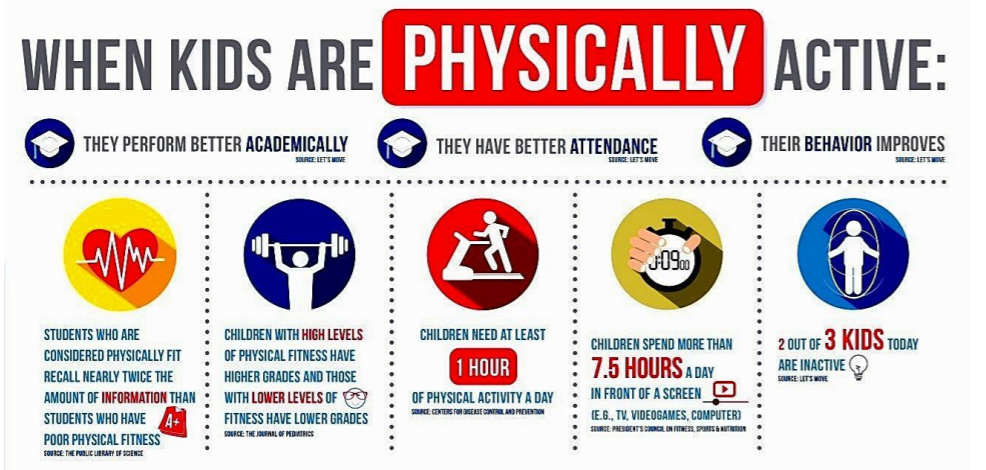 Disponível em: <https://www.paradigmsports.ca/a-healthy-mind-in-a-healthy-body/>. Acesso em: 09 out. 2018.
Disponível em: <https://www.paradigmsports.ca/a-healthy-mind-in-a-healthy-body/>. Acesso em: 09 out. 2018.
According to the information expressed in the image and data, when kids are physically active, we verify that
Observe o infográfico a seguir para responder à questão.

Disponível: https://morgan6062.com/2018/06/09/suicide-prevention-hotlines/. Acesso em: 08 out. 2019
According the information expressed in the image and data, Suicide Prevention, we verify that
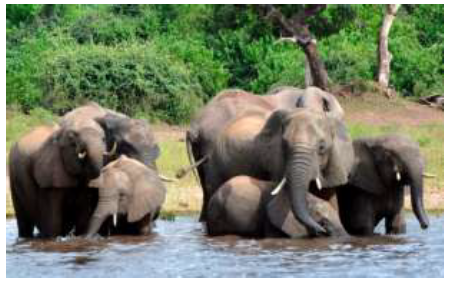
Some Botswanan MPs say the elephant population is out of control
Botswana is considering the reintroduction of big game hunting and reducing its elephant population by turning them into pet food. The recommendations were made in a recent report to Mokgweetsi Masisi, the president.
Botswana has around 130,000 elephants, the largest population in the world, and has long been hailed as a safe refuge for the species amid an Africa-wide poaching crisis. But some Botswanan MPs argue the population is out of control and puts lives and livelihoods of small scale farmers at risk.
The report says hunting would boost tourism while “managing’ the elephant population. It also called for “regular but limited” culling. It suggested meat from culled elephants could be used in canned pet food.
<https://www.pressreader.com; https://www.telegraph.co.uk>. Acesso em 25.fev.2019.
According to the text, this recent report has recommended
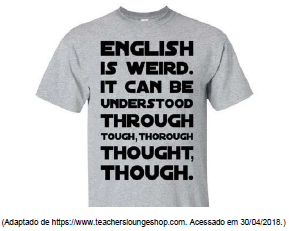
Os dizeres da camiseta
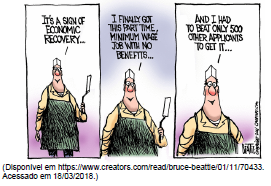
Este cartum foi criado pelo norte-americano Bruce Beattie,
em 2011. Nele, o cartunista faz uso da ironia para
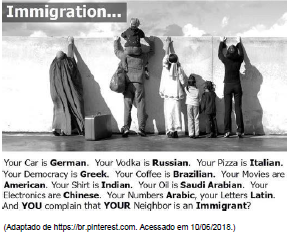
O post anterior aponta
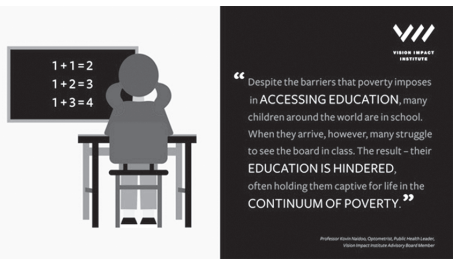
NAIDOO, Kovin, Disponível em: . Acesso em: 15 nov. 2018.
Fill in the parentheses with T (True) or F (False).
According to this quote by Professor Kovin Naidoo, it’s correct to say:
( ) Eye disability plays a minor role on an individual’s poverty status.
( ) Poor vision puts students at a disadvantage in the classroom.
( ) Poor eye health can lead to or worsen poverty.
( ) Vision impairment and poverty are linked to each other.
The correct sequence, from top to bottom, is
Tate Modern – London
Hélio Oiticica
Until Summer 2019

Tropicália
Tropicália is used to describe the explosion of cultural creativity in Rio de Janeiro and São Paulo in 1968 as Brazil’s military regime tightened its grip on power.
Many of the artists, writers and musicians associated with Tropicália came of age during the 1950s in a time of intense optimism when the cultural world had been encouraged to play a central role in the creation of a democratic, socially just and modern Brazil. Nevertheless, a military coup in 1964 had brought to power a right-wing regime at odds with the concerns of left-wing artists. Tropicália became a way of exposing the contradictions of modernisation under such an authoritarian rule.
The word Tropicália comes from an installation by the artist Hélio Oiticica, who created environments that were designed to encourage the viewer’s emotional and intellectual participation. Oiticica called them “penetrables” because people were originally encouraged to enter them. They mimic the improvised, colourful dwellings in Rio de Janeiro’s favelas, or shanty towns. The lush plants and sand help to convey a sense of the tropical character of the city. When Oiticica exhibited the work, he also included live parrots.
From its beginning, Tropicália was seen as a re-articulation of Anthropophagia (“cannibalism”), an artistic ideology promoted by Oswald de Andrade.
(www.tate.org.uk. Adaptado.)
Tate Modern – London
Hélio Oiticica
Until Summer 2019

Tropicália
Tropicália is used to describe the explosion of cultural creativity in Rio de Janeiro and São Paulo in 1968 as Brazil’s military regime tightened its grip on power.
Many of the artists, writers and musicians associated with Tropicália came of age during the 1950s in a time of intense optimism when the cultural world had been encouraged to play a central role in the creation of a democratic, socially just and modern Brazil. Nevertheless, a military coup in 1964 had brought to power a right-wing regime at odds with the concerns of left-wing artists. Tropicália became a way of exposing the contradictions of modernisation under such an authoritarian rule.
The word Tropicália comes from an installation by the artist Hélio Oiticica, who created environments that were designed to encourage the viewer’s emotional and intellectual participation. Oiticica called them “penetrables” because people were originally encouraged to enter them. They mimic the improvised, colourful dwellings in Rio de Janeiro’s favelas, or shanty towns. The lush plants and sand help to convey a sense of the tropical character of the city. When Oiticica exhibited the work, he also included live parrots.
From its beginning, Tropicália was seen as a re-articulation of Anthropophagia (“cannibalism”), an artistic ideology promoted by Oswald de Andrade.
(www.tate.org.uk. Adaptado.)
Tate Modern – London
Hélio Oiticica
Until Summer 2019

Tropicália
Tropicália is used to describe the explosion of cultural creativity in Rio de Janeiro and São Paulo in 1968 as Brazil’s military regime tightened its grip on power.
Many of the artists, writers and musicians associated with Tropicália came of age during the 1950s in a time of intense optimism when the cultural world had been encouraged to play a central role in the creation of a democratic, socially just and modern Brazil. Nevertheless, a military coup in 1964 had brought to power a right-wing regime at odds with the concerns of left-wing artists. Tropicália became a way of exposing the contradictions of modernisation under such an authoritarian rule.
The word Tropicália comes from an installation by the artist Hélio Oiticica, who created environments that were designed to encourage the viewer’s emotional and intellectual participation. Oiticica called them “penetrables” because people were originally encouraged to enter them. They mimic the improvised, colourful dwellings in Rio de Janeiro’s favelas, or shanty towns. The lush plants and sand help to convey a sense of the tropical character of the city. When Oiticica exhibited the work, he also included live parrots.
From its beginning, Tropicália was seen as a re-articulation of Anthropophagia (“cannibalism”), an artistic ideology promoted by Oswald de Andrade.
(www.tate.org.uk. Adaptado.)
Tate Modern – London
Hélio Oiticica
Until Summer 2019

Tropicália
Tropicália is used to describe the explosion of cultural creativity in Rio de Janeiro and São Paulo in 1968 as Brazil’s military regime tightened its grip on power.
Many of the artists, writers and musicians associated with Tropicália came of age during the 1950s in a time of intense optimism when the cultural world had been encouraged to play a central role in the creation of a democratic, socially just and modern Brazil. Nevertheless, a military coup in 1964 had brought to power a right-wing regime at odds with the concerns of left-wing artists. Tropicália became a way of exposing the contradictions of modernisation under such an authoritarian rule.
The word Tropicália comes from an installation by the artist Hélio Oiticica, who created environments that were designed to encourage the viewer’s emotional and intellectual participation. Oiticica called them “penetrables” because people were originally encouraged to enter them. They mimic the improvised, colourful dwellings in Rio de Janeiro’s favelas, or shanty towns. The lush plants and sand help to convey a sense of the tropical character of the city. When Oiticica exhibited the work, he also included live parrots.
From its beginning, Tropicália was seen as a re-articulation of Anthropophagia (“cannibalism”), an artistic ideology promoted by Oswald de Andrade.
(www.tate.org.uk. Adaptado.)
Analyse the following comic.
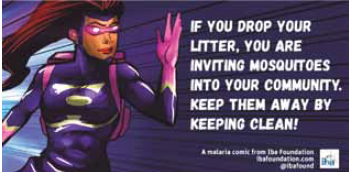
(http://iniscommunication.com)
The objective of the comic is to
The future is largely urban
By 2030, there will be 5 billion people living in
urban areas (61% of the estimated world
population of 8.2 billion)
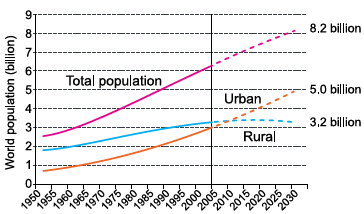
(http://esa.un.org. Adaptado.)
The chart shows that the approximate period of time when both urban and rural estimated populations were equal was
Cerrado

Located between the Amazon, Atlantic Forests and Pantanal, the Cerrado is the largest savanna region in South America.
The Cerrado is one of the most threatened and overexploited regions in Brazil, second only to the Atlantic Forests in vegetation loss and deforestation. Unsustainable agricultural activities, particularly soy production and cattle ranching, as well as burning of vegetation for charcoal, continue to pose a major threat to the Cerrado’s biodiversity. Despite its environmental importance, it is one of the least protected regions in Brazil.
Facts & Figures
• Covering 2 million km2 , or 21% of the country’s territory, the Cerrado is the second largest vegetation type in Brazil.
• The area is equivalent to the size of England, France, Germany, Italy and Spain combined.
• More than 1,600 species of mammals, birds and reptiles have been identified in the Cerrado.
• Annual rainfall is around 800 to 1600 mm.
• The capital of Brazil, Brasilia, is located in the heart of the Cerrado. • Only 20% of the Cerrado’s original vegetation remains intact; less than 3% of the area is currently guarded by law.
(http://wwf.panda.org. Adaptado.)

Cerrado

Located between the Amazon, Atlantic Forests and Pantanal, the Cerrado is the largest savanna region in South America.
The Cerrado is one of the most threatened and overexploited regions in Brazil, second only to the Atlantic Forests in vegetation loss and deforestation. Unsustainable agricultural activities, particularly soy production and cattle ranching, as well as burning of vegetation for charcoal, continue to pose a major threat to the Cerrado’s biodiversity. Despite its environmental importance, it is one of the least protected regions in Brazil.
Facts & Figures
• Covering 2 million km2 , or 21% of the country’s territory, the Cerrado is the second largest vegetation type in Brazil.
• The area is equivalent to the size of England, France, Germany, Italy and Spain combined.
• More than 1,600 species of mammals, birds and reptiles have been identified in the Cerrado.
• Annual rainfall is around 800 to 1600 mm.
• The capital of Brazil, Brasilia, is located in the heart of the Cerrado. • Only 20% of the Cerrado’s original vegetation remains intact; less than 3% of the area is currently guarded by law.
(http://wwf.panda.org. Adaptado.)
